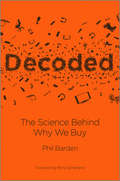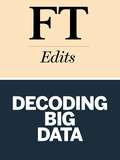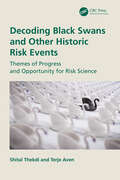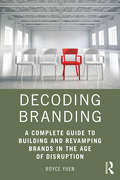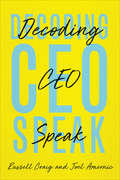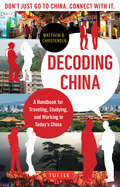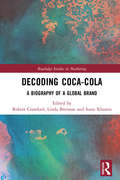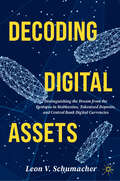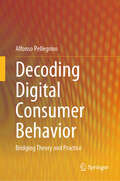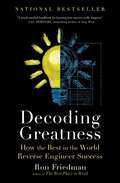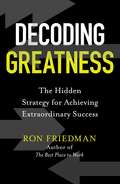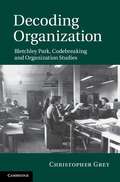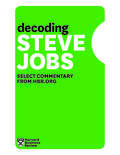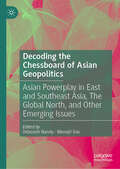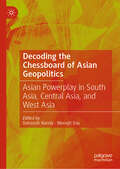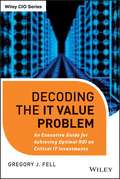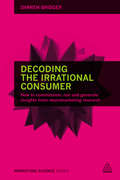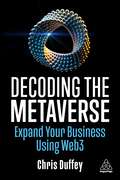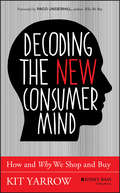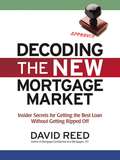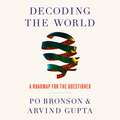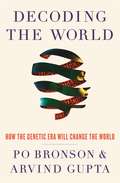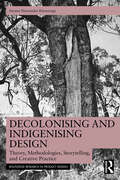- Table View
- List View
Decoded: The Science Behind Why We Buy
by Phil P. BardenIn this groundbreaking book Phil Barden reveals what decision science explains about people’s purchase behaviour, and specifically demonstrates its value to marketing. He shares the latest research on the motivations behind consumers’ choices and what happens in the human brain as buyers make their decisions. He deciphers the ‘secret codes’ of products, services and brands to explain why people buy them. And finally he shows how to apply this knowledge in day to day marketing to great effect by dramatically improving key factors such as relevance, differentiation and credibility. Shows how the latest insights from the fields of Behavioural Economics, psychology and neuro-economics explain why we buy what we buy Offers a pragmatic framework and guidelines for day-to-day marketing practice on how to employ this knowledge for more effective brand management - from strategy to implementation and NPD. The first book to apply Daniel Kahneman’s Nobel Prize-winning work to marketing and advertising Packed with case studies, this is a must-read for marketers, advertising professionals, web designers, R&D managers, industrial designers, graphic designers in fact anyone whose role or interest focuses on the ‘why’ behind consumer behaviour. Foreword by Rory Sutherland, Executive Creative Director and Vice-Chairman, OgilvyOne London and Vice-Chairman,Ogilvy Group UK Full colour throughout
Decoding Black Swans and Other Historic Risk Events: Themes of Progress and Opportunity for Risk Science
by Terje Aven Shital ThekdiThe field of risk science continues to learn from the long history of events to develop principles and practices that enable individuals, organizations, and societies to understand and manage future risk. Reflecting on these histories reminds us that risk and uncertainty are prevalent, yet it remains important to consider what is on the horizon: the possibility of future events, the consequences of those events, our vulnerability to those events, and how to recover from those events.Decoding Black Swans and Other Historic Risk Events offers a guide to understanding risk events and how to act before they occur. This book explores past risk events and analyzes how risk science principles apply to those events and studies whether current risk science concepts and approaches could potentially have avoided, reduced the impact, or supported recovery following the risk event. New insights are obtained by applying recent research progress in understanding and managing risk, considering aspects including quality of evidence, information, and misinformation in risk studies. The analysis results are used to identify how risk science approaches contribute to the overall management of risk and societal safety, and where improvements can be obtained, allowing the reader to possess a toolkit for identifying and planning for unsafe events.This title will be a critical read for professionals in the fields of occupational health and safety, risk management, civil engineering, mechanical engineering, energy, marine engineering, environmental engineering, business and management, and healthcare.
Decoding Branding: A Complete Guide to Building and Revamping Brands in the Age of Disruption
by Royce YuenDecoding Branding explains the evolution of branding and how the disrupting factors like digital revolution, technological advancement, changing consumer behavior, and the COVID-19 pandemic have reshaped the marketing landscape. Fundamental principles of fostering strong brands are distilled with illustrations of case studies from various industries. A structured and holistic framework to building and revamping brands is clearly presented for corporations to remain competitive in this constantly changing operating environment. Interviews with branding experts and corporate leaders are featured at the end of each chapter to allow readers to obtain a complete appreciation of brand development from different perspectives.
Decoding CEO-Speak
by Joel Amernic Russell CraigThe words of business leaders matter. They can spark action, enhance branding, share knowledge, transmit values, and influence social and cultural behavior. Decoding CEO-Speak critiques the public language of a powerful class of people – the Chief Executive Officers of major companies. Interest in the behavior and thinking of CEOs is not confined to their corporation’s direct stakeholders only: the public is increasingly interested in how CEOs stand on current issues and community debate. Through case study analysis of companies such as News Corporation, BP, Wells Fargo, Satyam, Uber, Canadian National Railway, Tesla, and Boeing, authors Russell Craig and Joel Amernic illustrate ways of mining meaning or decoding a CEO’s written words and speeches. They critically examine a variety of public media, including social media, testimony, and speeches, performed by leaders of major companies. Decoding CEO-Speak demonstrates how monitoring the language of CEOs can yield valuable insights into a company’s policy, strategy, and ethicality; and how it can point to the priorities, values, and personality of the CEO. The book will appeal to CEOs, senior managers, and public relations and media consultants, as well as business professors, students, and corporate stakeholders who want to find otherwise disguised meaning in the words of leaders.
Decoding China
by Matthew B. ChristensenDo you like to know the unspoken conversations going on around you when visiting other countries? Are you someone who likes to travel on your own terms-from finding that special restaurant to negotiating a better price for a prized antique in a local flea market? If so, Decoding China is the hands-on communication guide for you!Decoding China will teach you the basic "rules of the road" on how to operate in Chinese culture. Like every country, China has its own unique set of cultural "codes," ways of behaving on a daily basis that all Chinese automatically know are the norms. These codes frame every personal interaction in China, and carry with them subtle cultural expectations that the Chinese assume everyone else knows. By learning to recognize these key codes, words and phrases-and using them correctly-then everything you do in China will go a lot more smoothly.By drawing on extensive cultural and linguistic expertise, Dr. Christensen explains the key Chinese cultural codes and how to use these to your advantage. In practical chapters organized by topic, he shows you how to get things done in China, even with very minimal knowledge of the language. Being aware of the cultural norms and a few key words and phrases will give you tremendous confidence, and allow you to "crack the code" and achieve whatever you want. Decoding China will make your China experience work for you, rather than against you, wherever you travel in the country.
Decoding Coca-Cola: A Biography of a Global Brand (Routledge Studies in Marketing)
by Robert CrawfordThis collection of essays delves into the Coke brand to identify and decode its DNA. Unlike other accounts, these essays adopt a global approach to understand this global brand. Bringing together an international and interdisciplinary team of scholars, Decoding Coca-Cola critically interrogates the Coke brand as well its constituent parts. By examining those who have been responsible for creating the images of Coke as well as the audiences that have consumed them, these essays offer a unique and revealing insight into the Coke brand and asks whether Coca-Cola is always has the same meaning. Looking into the core meaning, values, and emotions underpinning the Coca-Cola brand, it provides a unique insight into how global brands are created and positioned.This critical examination of one of the world’s most recognisable brands will be an essential resource for scholars researching and teaching in the fields of marketing, advertising, and communication. Its unique interdisciplinary approach also makes it accessible to scholars working in other humanities fields, including history, media studies, communication studies, and cultural studies.
Decoding Digital Assets: Distinguishing the Dream from the Dystopia in Stablecoins, Tokenized Deposits, and Central Bank Digital Currencies
by Leon V. SchumacherCentral bank digital currency (CBDC) is on the horizon, with more than 130 central banks globally considering such projects. But is this beneficial for citizens and the financial system? This book offers a comprehensive guide on the intricate subjects of CBDCs, stablecoins, and tokenized deposits. Authored by an industry expert who has actively participated in the development of CBDC solutions, this book demystifies the complexities of CBDC and digital assets, presenting both the opportunities and challenges with practical examples and real-world contexts.The book covers the history of money and the background of cryptography and technology architectures that are shaping the future of payments. It presents the risks and opportunities that these digital assets and CBDCs mean for our society. It discusses how CBDCs and stablecoins can potentially stabilize digital payment systems, offers opportunities for immediate settlements, and facilitate efficient cross-border payments. However, it also notes the significant challenges, including legal and regulatory complexities, social impacts, privacy concerns, security threats, and the risk of mass-surveillance. The book explores the different characteristics of digital assets, the options available for each characteristic (like privacy, sovereignty,…) and provides detailed knowledge to judge the merits of the solutions proposed by private and public players.A must-read for anyone looking to understand the rapidly evolving world of digital currencies, this book encourages critical thinking about the opportunities and challenges presented by CBDCs and other digital assets and prompts readers to consider the vital aspects of privacy, security, and governance in an increasingly complex digital financial landscape.
Decoding Digital Consumer Behavior: Bridging Theory and Practice
by Alfonso PellegrinoThis book is a call to adopt more ethical, sustainable, and consumer-focused approaches in the digital era. The focus on consumer perceptions and expectations in a digital context is particularly relevant, as it delves into the psychological and behavioral aspects of digital interactions. The chapters on digital consumption and risk, and memory in the digital world, are pivotal in understanding how digital mediums impact consumer choices and brand recall. Online persuasion, a key topic, explores ethical and effective strategies for influencing consumer behavior, emphasizing the importance of authenticity and trust. The discussion on social comparison and its implications in digital consumption underscores the psychological impact of digital platforms. The chapters on humanistic and sustainable marketing, and digital customer experience, reflect the growing importance of ethical, sustainable practices, and customer-centric approaches in building brand loyalty. The book is an essential guide for marketing professionals and students, offering a comprehensive understanding of the complex interplay between digital marketing strategies and consumer behavior.
Decoding Greatness: How the Best in the World Reverse Engineer Success
by Ron FriedmanNational Bestseller For readers of Outliers, Atomic Habits, and Deep Work, comes a game-changing approach to unlocking your greatness, using a secret strategy that&’s vaulted business titans and creative geniuses to the top of their profession.We&’ve long been taught there are two ways to succeed—either talent or practice. In Decoding Greatness, award-winning social psychologist Ron Friedman illuminates a powerful third path—one that has launched icons in a wide range of fields, from artists, writers, and chefs, to athletes, inventors, and entrepreneurs: reverse engineering. To reverse engineer is to look beyond what is evident on the surface and find a hidden structure. It&’s the ability to taste an intoxicating dish and deduce its recipe, to listen to a beautiful song and discern its chord progression, to watch your favorite film and grasp its narrative arc. &“Clear, concise, and backed by science&” (Daniel Pink, author of When), Decoding Greatness marries &“alluring stories and illuminating studies&” (Adam Grant, author of Think Again) of top performers—from Agatha Christie to Andy Warhol, Barack Obama, to Serena Williams—with groundbreaking research on pattern recognition and skill acquisition. You&’ll learn how to take apart acheivements you admire, pinpoint precisely what makes them work, and apply that knowledge to develop novel ideas and products that are uniquely your own. Bursting with unforgettable stories and actionable strategies, Decoding Greatness is an indispensable guide to learning from the best, upgrading your skills, and sparking breakthrough ideas.
Decoding Greatness: The Hidden Strategy for Achieving Extraordinary Success
by Ron FriedmanThe game-changing approach to success that will transform the way you master new skills and generate creative ideas. Learn how to work like top performers and use reverse engineering to unlock your full potential. &‘An eye-opening, fast-paced read that will transform the way you approach your next project.&’ Shawn Achor For generations, we've been taught there are two ways to succeed - either from talent or through practice. In Decoding Greatness, award-winning social psychologist Ron Friedman illuminates a powerful third path - one that has quietly launched icons in a wide range of fields, from artists, writers, and chefs, to athletes, inventors and entrepreneurs: reverse engineering. To reverse engineer is to decode what works for others and learn how to apply those same methods and strategies to develop your own unique ideas and projects. Exploring what lies behind the success of top performers – from Agatha Christie to Andy Warhol, Barack Obama to Serena Williams, and many more – you will learn from the best. Combined with ground-breaking research on pattern recognition, skill acquisition, motivation, performance and creativity, this book is a practical guide to achieving success within any field. Decoding Greatness provides a new way of thinking and working, and through unforgettable stories and strategies, you will learn how to improve your skills and spark break-through ideas. And once you have learned this formula, you can apply it to anything.
Decoding Modern Consumer Societies
by Hartmut Berghoff Uwe SpiekermannDrawing on a wide range of studies of Europe, the United States, Asia, and Africa, the contributions gathered here consider how political history, business history, the history of science, cultural history, gender history, intellectual history, anthropology, and even environmental history can help us decode modern consumer societies.
Decoding Organization
by Christopher GreyHow was Bletchley Park made as an organization? How was signals intelligence constructed as a field? What was Bletchley Park's culture and how was its work co-ordinated? Bletchley Park was not just the home of geniuses such as Alan Turing, it was also the workplace of thousands of other people, mostly women, and their organization was a key component in the cracking of Enigma. Challenging many popular perceptions, this book examines the hitherto unexamined complexities of how 10,000 people were brought together in complete secrecy during World War II to work on ciphers. Unlike most organizational studies, this book decodes, rather than encodes, the processes of organization and examines the structures, cultures and the work itself of Bletchley Park using archive and oral history sources. Organization theorists, intelligence historians and general readers alike will find in this book a challenge to their preconceptions of both Bletchley Park and organizational analysis.
Decoding Steve Jobs
by Harvard Business ReviewObservations on Steve Job's legacy - and Apple's leadership future - are only just beginning. In recent years, many leading thinkers have contributed their thoughts on the Jobs phenomenon on HBR.org. We've compiled a few of the most insightful here, and we invite you to read them through the lens of business lessons to be learned. We've selected six pieces: two from after Jobs's August 2011 retirement and four from before. We hope you will enjoy them, learn from them, and continue to turn to HBR.org for ideas and inspiration.
Decoding the Chessboard of Asian Geopolitics: Asian Powerplay in East and Southeast Asia, The Global North, and Other Emerging Issues
by Debasish Nandy Monojit DasThis book is part of a two-volumes exploration comprising 18 chapters organized into four distinct thematic sections. This volume delves into the geopolitical dynamics and power relations in East and Southeast Asia and the Global North. It examines the interactions of regional and extra-regional powers from both military and soft power perspectives. It highlights China's influence in the Indo-Pacific region, Russia's involvement in Myanmar's political economy, and Taiwan's situation. It also examines the dynamics of India-Taiwan relations and North Korea's foreign policy. This book presents interconnected discussions on various themes, offering valuable insights for readers. It provides useful insights into the role of the Global North from multiple perspectives. This will benefit students, scholars, and academicians from diverse disciplines such as International Relations, Foreign Policy, Defence and Strategic Studies, Political Science, Peace and Conflict Studies, and Journalism. The other volume provides an in-depth analysis of the intricate power struggles within this Asian region, with a particular focus on India, and delves into the power dynamics of Central Asia, and West Asia offering a comprehensive examination of the geopolitical and power-related issues that shape these regions.
Decoding the Chessboard of Asian Geopolitics: Asian Powerplay in South Asia, Central Asia, and West Asia
by Debasish Nandy Monojit DasThe edited volume titled "Decoding the Chessboard of Asian Geopolitics: Asian Powerplay in South Asia, Central Asia, and West Asia" offers a distinctive examination of the power rivalries within the Asian region. It highlights the significant influence of extra-regional powers on South Asia's political, economic, foreign policy, and security landscapes. This volume also delves into the intricate power dynamics in Central Asia and West Asia. In light of recent global transformations, Asia emerges as a formidable entity that not only confronts the challenges of uncertainty but also plays a pivotal role in shaping contemporary geopolitics. Comprising 22 chapters, this volume provides a critical analysis of both internal and external factors influencing Asian Powerplay. It emphasizes the significance of the Indo-Pacific region, the Non-Alignment Movement, and the concept of multipolarity. Furthermore, it addresses various issues from traditional security to human security across four distinct sectors.The scholars of International Relations, Defence Studies, Political Science, Strategic Studies, Journalism, Peace and conflict Studies,etc., will be benifited by this volume across the globe. This book is part of a two-volume set and the other volume in this set delves into the geopolitical dynamics and power relations in East and Southeast Asia and the Global North.
Decoding the DNA of the Toyota Production System (HBR Bestseller)
by H. Kent Bowen Steven J. SpearThe Toyota Production System is a paradox. On the one hand, every activity, connection, and production flow in a Toyota factory is rigidly scripted. Yet at the same time, Toyota's operations are enormously flexible and responsive to customer demand. How can that be? After an extensive four-year study of the system in more than 40 plants, the authors came to understand that at Toyota it's the very rigidity of the operations that makes the flexibility possible. That's because the company's operations can be seen as a continuous series of controlled experiments. Whenever Toyota defines a specification, it is establishing a hypothesis that is then tested through action. This approach--the scientific method--is not imposed on workers, it's ingrained in them. And it stimulates them to engage in the kind of experimentation that is widely recognized as the cornerstone of a learning organization. The Toyota Production System grew out of the workings of the company over 50 years, and it has never actually been written down. Making the implicit explicit, the authors lay out four principles that show how Toyota sets up all its operations as experiments and teaches the scientific method to its workers. The first rule governs the way workers do their work. The second, the way they interact with one another. The third governs how production lines are constructed. And the last, how people learn to improve. Every activity, connection, and production path designed according to these rules must have built-in tests that signal problems immediately. And it is the continual response to those problems that makes this seemingly rigid system so flexible and adaptive to changing circumstances.
Decoding the IT Value Problem
by Gregory J. FellGain greater returns from your IT investmentsRevealing the secrets to proven, effective strategies that enable businesses to leverage the full value of highly expensive IT investments, Decoding the IT Value Problem is a no-nonsense guide for making smart IT investments and cutting through the noise of vendor marketing and media hype. Author Gregory Fell describes in rich detail the actual processes, frameworks, infrastructure and discipline required to develop and execute corporate IT strategies that areprofitable and sustainable.Provides a proven framework for developing and successfully executing profitable IT strategiesPlain English guidance for gaining the most return on investment from critical IT investmentsExplores developing and executing IT strategy; forecasting, calculating and managing IT costs; leveraging IT investments to drive business growth; IT and the evolving global economy; IT value management; communicating IT value across the enterprise; and leading change, transformation and innovationIf you're a senior level manager or executive responsible for managing IT value in your business, Decoding the IT Value Problem is the practical and clearly written guide you'll turn to, with tools and tips for smart investment and management of IT costs.
Decoding the Irrational Consumer
by Darren BridgerDecoding the Irrational Consumer was written to help marketing practitioners demystify neuromarketing, a relatively new field of marketing research used to understand consumer response to marketing stimuli. This book presents in plain terms the key theoretical tools required to implement neuromarketing studies and achieve desired research outcomes. Marketers and researchers will learn how to effectively and confidently brief data processors, and confer with neuroscientists and technicians. They will gain keen understanding of recent developments in behavioural science and data-processing technology, as well as sophisticated neuromarketing tools used to understand subconscious responses including behavioural economics, eye-tracking, implicit response measures, and facial coding. The author discusses when to apply these techniques and others, how to combine them effectively and how to correctly interpret resulting data to generate valuable insights that aid in decision making. About the series: The Marketing Science series makes difficult topics accessible to marketing students and practitioners by grounding them in business reality. Each book is written by an expert in the field and includes case studies and illustrations enabling marketers to gain confidence in applying the tools and techniques and in commissioning external research.
Decoding the Metaverse: Expand Your Business Using Web3
by Chris DuffeyDiscover the profitable business opportunities within the metaverse and learn how you can and why you should get your company involved today. In Decoding the Metaverse, Creative Cloud strategist and Web3 expert Chris Duffey establishes a roadmap for entry to the metaverse. Written to help businesses get a handle on a complex new business opportunity, the book begins by explaining how previous iterations of the internet led to the creation of immersive digital technology with Web3 before detailing the building blocks of the metaverse. The book takes readers through the future of digital spaces, offering insight into immersive experiences, customer engagement, product-led growth and profitability. The chapters focus on the building blocks of the metaverse, including NFTs, blockchain, tokenomics, gaming and virtual real estate. Each chapter is paired with a corresponding case study from well-known brands currently working in the metaverse. Decoding the Metaverse ends with guiding principles about the ethical ramifications of immersive experiences and digital governance.Throughout Decoding the Metaverse, Duffey highlights the importance of reaching customers through shared immersive experiences. Showcasing the potential impact of working with Web3, he explains how companies can use these opportunities to further their reach and grow their revenue. Readers will step away from the book eager to get their companies involved today.
Decoding the New Consumer Mind
by Kit YarrowA decade of swift and stunning change has profoundly affected the psychology of how, when, and why we shop and buy. In Decoding the New Consumer Mind, award-winning consumer psychologist Kit Yarrow shares surprising insights about the new motivations and behaviors of shoppers, taking marketers where they need to be today: into the deeply psychological and often unconscious relationships that people have with products, retailers, marketing communications, and brands. Drawing on hundreds of consumer interviews and shop-alongs, Yarrow reveals the trends that define our transformed behavior. For example, when we shop we show greater emotionality, hunting for more intense experiences and seeking relief and distraction online. A profound sense of isolation and individualism shapes the way we express ourselves and connect with brands and retailers. Neurological research even suggests that our brains are rewired, altering what we crave, how we think, and where our attention goes.Decoding the New Consumer Mind provides marketers with practical ways to tap into this new consumer psychology, and Yarrow shows how to combine technology and innovation to enhance brand image; win love and loyalty through authenticity and integrity; put the consumer's needs and preferences front and center; and deliver the most emotionally intense, yet uncomplicated, experience possible. Armed with Yarrow's strategies, marketers will be able to connect more effectively with consumers--driving profit and success across the organization.
Decoding the New Mortgage Market: Insider Secrets for Getting the Best Loan Without Getting Ripped Off
by David ReedThe housing market is in turmoil, but if there’s a silver lining, it’s the fact that purchase prices are at historic lows. Sure, there are still plenty of predatory lenders waiting to exploit the naïve potential buyer, but those who do their homework will be rewarded with a fair price and manageable mortgage terms. Decoding the New Mortgage Market is a map to finding the best and most realistic mortgage deals while navigating past potential obstacles and traps. <P><P> Filled with money-saving advice, this practical guide will help prospective buyers understand: • How new lending and underwriting rules affect today’s homebuyer • Different loan types and lending institutions • Credit issues and other qualifying factors • Creative down-payment solutions • How to reduce closing costs and other fees Because lenders and buyers alike have gotten “burned” in the mortgage crisis, finding and qualifying for a manageable loan may now be more difficult. Readers will find that Decoding the New Mortgage Market makes the search both easier and more fruitful, and that their dreams of home ownership are still within their reach.
Decoding the World
by Arvind Gupta Po BronsonA vision of the future where the latest Silicon Valley tech meets cutting-edge genetics.Po Bronson and Arvind Gupta, venture capitalists from Silicon Valley, take everyday news headlines and decode them, leading us on a journey through their unique and highly entertaining view of the world. Each chapter is prefaced with a real-world headline from today's chaotic news cycle: Dying bees. Rogue planets. Beyond Meat. Glaciers melting. Bronson and Gupta decipher what's really going on behind these headlines, and why. They offer first-hand experience in funding technologies to solve these problems, most of which involve genetic engineering.But what the authors then do with that premise is always surprising and unexpected. One moment they are ripping it down to the bare bones physics or chemistry, and then they invoke history, philosophy, or psychology, all the while using joyful literary devices and storylines from popular movies. Decoding the World is the kind of book you get when you give two guys $40 million, a world full of messy big problems, a genetics laboratory to play in, and a set of Borges' collected works. After looking through their lens, you'll never see the world the same.(P)2020 Hachette Audio
Decoding the World: A Roadmap For The Questioner
by Arvind Gupta Po BronsonA vision of the future where the latest Silicon Valley tech meets cutting-edge genetics.Decoding the World is a buddy adventure about the quest to live meaningfully in a world with such uncertainty. It starts with Po Bronson coming to IndieBio.Arvind Gupta created IndieBio as a laboratory for early biotech startups trying to solve major world problems. Glaciers melting. Dying bees. Infertility. Cancer. Ocean plastic. Pandemics.As they travel around the world, finding scientists to join their cause, the authors bring their first-hand experience to the great mysteries that haunt our future. Natural resource depletion. Job-taking robots. China's global influence.Decoding the World is the kind of book you get when you give two guys $40 million, a world full of messy big problems, a genetics laboratory to play in, and a set of Borges' collected works. After looking through their lens, you'll never see the world the same.
Decolonising and Indigenising Design: Theory, Methodologies, Storytelling, and Creative Practice (Routledge Research in Product Design)
by Desiree Hernandez IbinarriagaThis book offers a new approach to design theory and practice that draws on Indigenous knowledges, methodologies and methods, presenting concepts of decolonising and Indigenous design that are interweaved as theory, storytelling, and practices.The arena of design sustainability, social design, and innovation has been a site of debate since the 1960s. Yet, the ways in which design has redefined this complex realm has not directly addressed Indigenous ways of being, knowing, and doing, which could be of paramount importance to the transformation of the design field and beyond in creative practices. In response, this book offers valuable insights into how design practitioners can incorporate Indigenous practices to decolonise education, research, and design, and dismantle colonised paradigms, ways of thinking and practice in design. This approach is presented through storytelling, theory, methodology, methods, and practical examples to enlighten the reader. The book proposes a transformation in the role designers play, through understanding relationality between people, land, and the immaterial, while giving voice and agency to the land and waters, Our Mother Earth. Design is considered as a way to harness opportunities through the deep connection between people and Place, and the book critically promotes a more contextual and dynamic understanding of decolonising and Indigenising design practices and spaces through relational design.This book will be useful for students and scholars studying in the fields of design, art, architecture, culture, decolonising methodologies, biocultural diversity, and design beyond human and materiality.
